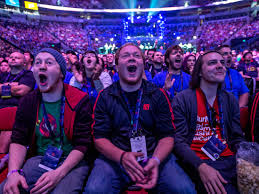CFP: eSports and professional game play
The purpose of this special issue is to investigate the rise of eSports.
Much has happened in the area of professional gaming since the Space Invaders Championship of 1980. We have seen live Internet streaming eclipse televised eSports events, such as on the American show Starcade.
Authors are invited to submit manuscripts that
- Examine the emergence of eSports
- The uses of streaming technology
- Traditions of games that support professional players – chess, go, bridge, poker, league of legends, Dota 2, Starcraft
- Fan perspectives
- Professional player perspectives
- Market analysis
- Meta-analyses of existing research on eSports
- Answer specific questions such as:
- How should game user research examine the emergence of eSports? Should we differentiate pragmatic and hedonic aspects of the game?
- What are the methodologies for conducting research on eSports?
- What is the role of player, the audience, the developer, the venue?
- Case studies, worked examples, empirical and phenomenological, application of psychological and humanist approaches?
- Field research
- Face to face interviewing
- Creation of user tests
- Gathering and organizing statistics
- Define Audience
- User scenarios
- Creating Personas
- Product design
- Feature writing
- Requirement writing
- Content surveys
- Graphic Arts
- Interaction design
- Information architecture
- Process flows
- Usability
- Prototype development
- Interface layout and design
- Wire frames
- Visual design
- Taxonomy and terminology creation
- Copywriting
- Working with programmers and SMEs
- Brainstorm and managing scope (requirement) creep
- Design and UX culture
Potential authors are encouraged to contact Brock R. Dubbels (Dubbels@mcmaster.ca) to ask about the appropriateness of their topic.
Deadline for Submission July 2016.
Authors should submit their manuscripts to the submission system using the following link:
http://www.igi-global.com/authorseditors/titlesubmission/newproject.aspx
(Please note authors will need to create a member profile in order to upload a manuscript.)
Manuscripts should be submitted in APA format.
They will typically be 5000-8000 words in length.
Full submission guidelines can be found at: http://www.igi-global.com/journals/guidelines-for-submission.aspx
Mission – IJGCMS is a peer-reviewed, international journal devoted to the theoretical and empirical understanding of electronic games and computer-mediated simulations. IJGCMS publishes research articles, theoretical critiques, and book reviews related to the development and evaluation of games and computer-mediated simulations. One main goal of this peer-reviewed, international journal is to promote a deep conceptual and empirical understanding of the roles of electronic games and computer-mediated simulations across multiple disciplines. A second goal is to help build a significant bridge between research and practice on electronic gaming and simulations, supporting the work of researchers, practitioners, and policymakers.
Can UX research take a game that is not fun, and make it more fun?
CFP: UX — What is User Experience in Video Games?
The purpose of this special issue is to investigate the nature of video game UX.
ISO 9241-210[1] defines user experience as “a person’s perceptions and responses that result from the use or anticipated use of a product, system or service”. According to the ISO definition, user experience includes all the users’ emotions, beliefs, preferences, perceptions, physical and psychological responses, behaviors and accomplishments that occur before, during and after use. The ISO also list three factors that influence user experience: system, user and the context of use.
In this issue we hope to present practitioners and academic perspectives through presenting a broad range of user experience evaluation methods and concepts; application of various user experience evaluation methods; how UX fits into video game development cycle; methods of evaluating user experience during game play and after; and social play.
Authors are invited to submit manuscripts that
- Present empirical findings on UX in game development
- Push the theoretical knowledge of UX
- Conduct meta-analyses of existing research on UX
- Answer specific questions such as:
- Case studies, worked examples, empirical and phenomenological, application of psychological and humanist approaches?
- Field research
- Universal Access
- Face to face interviewing
- Creation of user tests
- Gathering and organizing statistics
- Define Audience
- User scenarios
- Creating Personas
- Product design
- Feature writing
- Requirement writing
- Content surveys
- Graphic Arts
- Interaction design
- Information architecture
- Process flows
- Usability
- Prototype development
- Interface layout and design
- Wire frames
- Visual design
- Taxonomy and terminology creation
- Copywriting
- Working with programmers and SMEs
- Brainstorm and managing scope (requirement) creep
- Design and UX culture
- What is the difference between user experience and usability?
- How does UX research extend beyond examination of the UI? Should we differentiate pragmatic and hedonic aspects of the game?
- Who is a User Experience researcher, what do they do, and how does one become one?
- What are the methodologies?
Potential authors are encouraged to contact Brock Dubbels (Dubbels@mcmaster.ca) to ask about the appropriateness of their topic.
Deadline for Submission January 2014.
Authors should submit their manuscripts to the submission system using the following link:
http://www.igi-global.com/authorseditors/titlesubmission/newproject.aspx
(Please note authors will need to create a member profile in order to upload a manuscript.)
Manuscripts should be submitted in APA format.
They will typically be 5000-8000 words in length.
Full submission guidelines can be found at: http://www.igi-global.com/journals/guidelines-for-submission.aspx
Mission – IJGCMS is a peer-reviewed, international journal devoted to the theoretical and empirical understanding of electronic games and computer-mediated simulations. IJGCMS publishes research articles, theoretical critiques, and book reviews related to the development and evaluation of games and computer-mediated simulations. One main goal of this peer-reviewed, international journal is to promote a deep conceptual and empirical understanding of the roles of electronic games and computer-mediated simulations across multiple disciplines. A second goal is to help build a significant bridge between research and practice on electronic gaming and simulations, supporting the work of researchers, practitioners, and policymakers.








